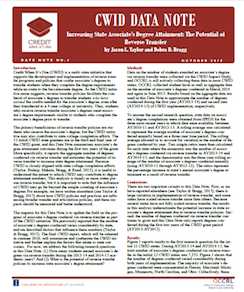National data show that the majority of students who transfer from a community college to a 4-year college or university do so without an associate’s degree (Hoachlander, Sikora, & Horn, 2003), and the many of these students never make it to the bachelor’s degree (Shapiro, et al., 2013). Yet, many of these students earned the credits needed for an associate’s degree. The Credit When It’s Due (CWID) initiative is focused on developing reverse transfer programs and policies to confer transfer students associate’s degrees when they meet the degree requirements. The primary beneficiaries of the reverse transfer policies are students; these students have completed the credits needed for an associate’s degree similar to students who complete the associate’s degree prior to transfer.
CWID policies may also benefit state college completion efforts, and this new CWID Data Note examines the potential contribution of reverse transfer to state associate’s degree attainment numbers. Based on data from the first two years of the CWID initiative, the results of this analysis suggest that reverse transfer policies may boost state associate’s degree attainment up to 18%, as is the case in Hawaii. In most other states, this percentage ranges from 1-5%. However, state reverse transfer policies are in their infancy and have not yet fully matured, so this analysis likely underestimates the potential of reverse transfer to increase state associate’s degree attainment numbers.
This Data Note informs the ongoing policy and practice dialogue around reverse transfer. Policymakers and educational leaders should elicit lessons from all CWID states, but especially states where policy and practice are scaled to a more mature level. Results from Hawaii are instructive because Hawaii has scaled reverse transfer policies and processes along several dimensions (Taylor & Bragg, 2015). For example, Hawaii’s public system of higher education has an integrated data system that includes all public institutions; an opt-out consent policy that maximizes the number of students eligible to participate in reverse transfer; an automated process via the “STAR” system that both identifies eligible students and executes preliminary degree audits; a general education system that maps college learning outcomes to college courses so that general education requirements can be fulfilled based on learning outcomes, not just course completion; a reverse transfer policy that allows substitutions and waivers for institutional-specific degree requirements identified as barriers to reverse transfer completion; and leadership commitment to sustain re-verse transfer by institutionalizing the process. Hawaii also benefits from a centralized public higher education governance structure that facilitates the implementation of transfer and articulation policies, including reverse transfer policies.
Although many states across the nation have not implemented reverse transfer at scale, nor have they fully developed or refined reveres transfer policies, it is important to understand the potential contribution of CWID to state college completion efforts and to monitor results to understand what is possible at scale.
References
- Hoachlander, G., Sikora, A. C., & Horn, L. (2003). Community college students: Goals, academic preparation, and outcomes. Education Statistics Quarterly, 5(2), 121-170.
- Shapiro, D., Dundar, A., Ziskin, M., Chiang, Y., Chen, J., Harrell, A., & Torres, V. (2013). Baccalaureate attainment: A national view of the postsecondary outcomes of students who transfer from two-year to four-year institutions. Herndon, VA: National Student Clearinghouse.
- Taylor, J. L., & Bragg, D. D. (2015, January). Optimizing reverse transfer policies and processes: Lessons from twelve CWID states. Champaign, IL: Office of Community College Research and Leadership, University of Illinois at Urbana-Champaign.
Jason L. Taylor is an assistant professor of higher education in the Department of Educational
Leadership and Policy at the University of Utah and is Co-PI for the Credit When It’s Due initiative research
Dr. Debra D. Bragg is the founding director of the Office of Community College Research and Leadership
